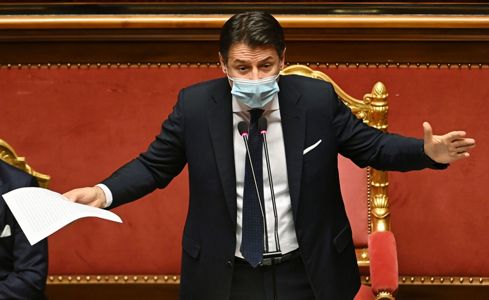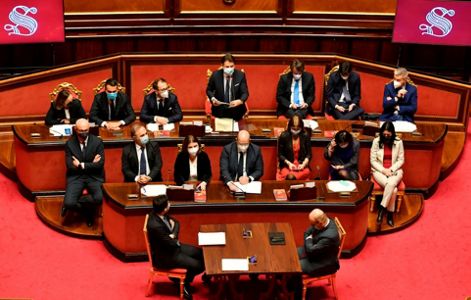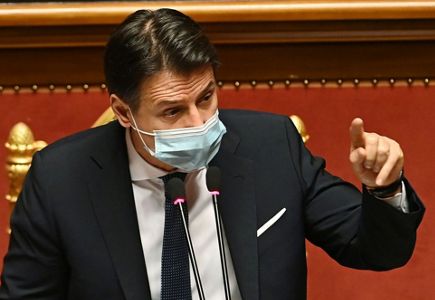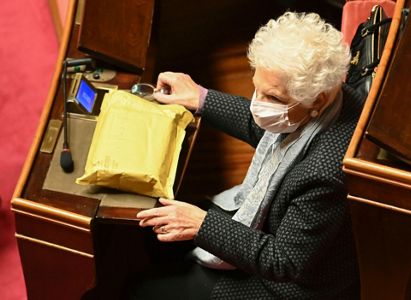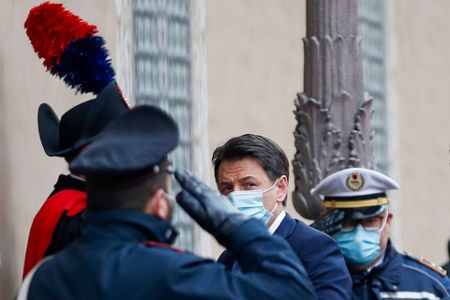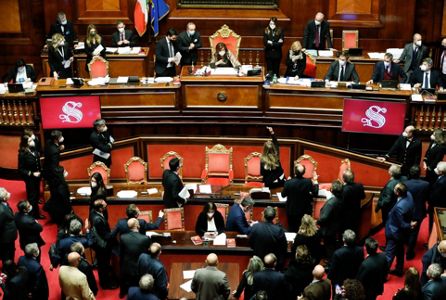ROME (AP) — Italian Premier Giuseppe Conte squeaked through a crucial Senate confidence vote Tuesday night, allowing him to keep his wobbly coalition afloat but failing to secure the reliable support needed from lawmakers to help him effectively govern the country with its pandemic-pummeled economy.
The vote went 156 to 140 in his favor. There were 16 abstentions, thanks to a small but key coalition ally that bolted the center-left coalition last week, jeopardizing Conte's survival at the nation's helm. Two of the yes votes came from the center-right opposition party led by ex-Premier Silvio Berlusconi.
An absolute majority in the Senate is 161, so to pass critical legislation, including aid to help Italy's battered economy, Conte faces the unpleasant prospect of having to rely on lawmakers outside his coalition.
Conte tweeted that “now the aim is to make this majority more solid. Italy doesn't have a minute to lose. Right to work to overcome the health emergency and the economic crisis.”
Had he lost, Conte would have been required to resign. He could till opt to hand in his resignation to Italian President Sergio Mattarella, in a bid to be tapped anew to try to cobble together a revamped, more solid coalition.
Conte's tweet indicated, however, that he wanted to try to forge on, no matter how hobbled his coalition was left by the defection of lawmakers loyal to former Premier Matteo Renzi.
With the vote barely counted, right-wing opposition members started demanding Conte and his oft-bickering, shrunken coalition quit.
Among them was Giorgia Meloni, who heads the fast-rising far-right Brothers of Italy party.
“The numbers speak clearly,” she said, referring to Conte's winning the confidence vote with the help of ballots from senators-for-life, who are outside party ranks, and the abstentions by Renzi loyalists.
"We're waiting to learn if the president of the republic thinks that in these conditions Conte can go forward,'' Meloni said.
In pitching for the Senate's backing, Conte acknowledged his government's survival was in its hands. “If we don't have the (vote) numbers, this government goes home,” he said.
Italy is rolling out its COVID-19 vaccination program. It must also tell the European Union by next month how it plans to spend more than 200 billion euros (dollars) in funds earmarked by Brussels to help Italy's health system, sorely tested by the pandemic, and revive an economy, which was stagnant for years before pandemic lockdowns caused many businesses to struggle to survive.
In the lower Chamber of Deputies, where the 16-month-old government holds a more comfortable margin, Conte won a first confidence vote on Monday.
Last week, Renzi yanked his two ministers from his small, centrist Italia Viva (Italy Alive) party, in a spat over how much control Conte would hold in deciding how the EU largesse gets spent.
Renzi has hammered away at what he depicted as Conte's less-than-bold response to fighting the pandemic, including in how funds will be spent to revive Italy's battered economy, already stagnant for years before COVID-19 struck.
Even though he triggered Conte's political crisis, within hours of the Senate vote, Renzi indicated he would consider returning to the coalition if asked. That is a bold stance, considering the Democrats, a main coalition partner, ruled out making any coalition deal with defector Renzi.
A few of the votes in Conte's favor came from the tiny ranks of senators-for-life, who only occasionally come to Parliament to cast votes.
Among them was Liliana Segre, a 90-year-old Holocaust survivor and senator-for-life who traveled from Milan to vote, Segre was made a senator-for-life by Italy's president to honor her work in keeping the memory of the Holocaust alive by speaking to students in schools throughout the nation.
If Conte's coalition does fold, and no solid one can be tapped to replace it, elections two years early could result. But Mattarella is considered unlikely at this point to choose that option, given the difficulty of organizing a campaign and vote during a pandemic.
In boasting of how much EU pandemic recovery aid should be coming Italy's way, Conte held himself out as staunchly pro-EU in a bid to appeal to centrists. But that is a stance in striking contrast with the oft-Euro-skeptic view from some in his senior coalition partner, the populist 5-Star Movement.
Renzi and the 5-Stars had clashed over the Movement's refusal to accept EU loan money to help reinforce Italy's health care system.
In Brussels, EU officials were following Italian political developments with concern.
EU Vice President Valdis Dombrovskis expressed hope that Italy's “political instability would not compromise” Italy's already “substantial” preparation of the recovery plan. He noted that Italy is by far the largest recipient of the pandemic funding.
Barry reported from Milan. Nicole Winfield in Rome and Raf Casert in Brussels contributed.
Copyright 2021 The Associated Press. All rights reserved. This material may not be published, broadcast, rewritten or redistributed without permission.


